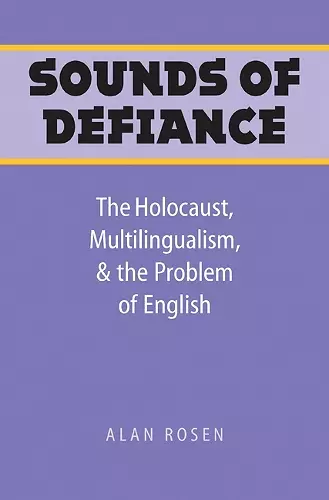Sounds of Defiance
The Holocaust, Multilingualism, and the Problem of English
Format:Paperback
Publisher:University of Nebraska Press
Published:1st Dec '08
Currently unavailable, and unfortunately no date known when it will be back

A study of the development and significance of English writing on the Holocaust since the Second World War
Language has frequently been at the centre of discussions about Holocaust writing. This title chronicles the status of English in writing about the Holocaust, from the period of the Second World War to the 1990s. It provides a perspective on such standard works as "Eichmann in Jerusalem", "The Shawl", and "Maus".Language has frequently been at the center of discussions about Holocaust writing. Yet English, a primary language of neither the persecutors nor the victims, has generally been viewed as marginal to the events of the Holocaust. Alan Rosen argues that this marginal status profoundly affects writing on the Holocaust in English and fundamentally shapes our understanding of the events. Sounds of Defiance chronicles the evolving status of English in writing about the Holocaust, from the period of the Second World War to the 1990s. Each chapter highlights a representative work from a different genre—psychology, sociology, memoir, tales, fiction, and film—and examines the special position of English with regard to the Holocaust, supported by references to the role of other languages, including Hebrew, Yiddish, and German. This original approach provides a new perspective on such standard works as Eichmann in Jerusalem, The Shawl, and Maus, while drawing attention to others largely unknown. Rosen also links this analysis of English writing to developments in the postwar period: the escalating production of writing on the Holocaust in English; the increasing prestige of English as a global language; and paradoxically, within the contexts of neocolonial and multilingual studies, the increasingly uncertain position of English.
“Sounds of Defiance is a comprehensive work that establishes links between otherwise distinct forms of expression. Most impressive is the reliable connective tissue that Rosen creates to explore the roles of language through six decades of Holocaust self-representation. In the end, Rosen delivers a valuable and broad-ranging resource to students of linguistics, film, poetics, and the psychology of traumatic memory.”—Jonathan M. Alexander, Holocaust and Genocide Studies
ISBN: 9780803220683
Dimensions: unknown
Weight: 397g
250 pages